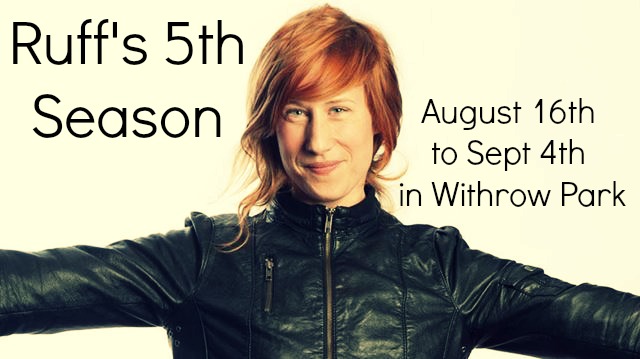


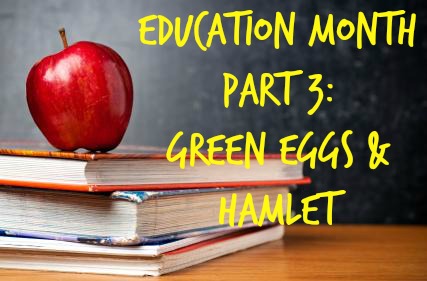
University of Alberta professor, David Ley’s, shares his exciting way into teaching and speaking Shakespeare. David uses the words of Dr. Seuss to help actors find and use the rhetorical structures Shakespeare provides. It may seem like a strange pairing, but here David explains to us the impact it has on the way actors understand and take hold of language.
How did you come up with this technique? What made you connect Seuss with Shakespeare?
I did a lot of reading to my own kids and since I’m interested in pattern identification I think I began hearing it; I have a mind that naturally compares and contrasts. All teaching looks for deep structure – what are we trying to get at underneath it – and so I think that’s where it all began.
I take my students to go and read to Junior Kindergarten classes and I do that because the thing that is going to hold our interest when we’re 4 is the same as when we’re 40 or 80. The ‘I Can Read’ series by Dr. Seuss should be called the ‘I Can Communicate’ series. I’ve always been interested in rhetoric and Seuss & Shakespeare each highlight different rhetorical structures. Dr. Seuss invites a playfulness that’s often missing in Shakespeare, as well as the willingness to engage in playfulness.
I think both are brilliant and people often say that in 400 years we’ll still be reading Dr. Seuss… We have become denotative… For example, the word, “ocean” can be so many different things, from a big wonderful place to a terrifying place. Seuss teaches us how to express these things – big or small, far or near, good or bad, but we often fail to give this information in the support of our communication.
What can Seuss teach us about Shakespeare’s words? Structure? Rhetoric?
I love Sister Miriam Joseph’s books (Shakespeare’s Use of the Arts of Language) and books that list endless numbers of forms of rhetoric. When an actor picks that up, when you embrace it and you invest in it, it actually takes you somewhere bigger. In repetition, for example, what a modern actor will do is make them all different because they’ll go, “I can’t be all the same,” so what they’ll do is take it apart and spread it out on the field instead of stacking it. When you stack and you stack and you stack, you realize the power of repetition… So, there’s the aspect of repetition, there’s the breadth of antithesis; you can pitch tag an argument:
‘Shall I compare thee to a summer’s day?’ Now as I continue through that speech, I actually now know that when I hit this pitch I’m talking about you and when I hit this pitch, I’m talking about the summer’s day. If I’m talking about apples and oranges it’s different than apples and jumbo jets. Then I would have to have a greater range in my voice to tell you that the things that I’m comparing are much further apart. So, things like that help the audience follow the language.
Articulation is another thing. I’m old fashioned because I always say let’s see what it’s like if we just pronounce all the consonants… We use, in a way, the Dr. Seuss to see how much people are accustomed to investing in sounds, so that the quality of the sound itself has an inherent action in it: “Love is not love which alters when it alteration finds.” If you don’t do the “v” on “love”, “luffing” is something a sail does when there’s no wind in it. I think if an actor invests in the word, if you look somebody in the eye and say, “I love you,” and you commit to every sound of that word, you’re actually going to feel something. Then the text can actually take you somewhere, you don’t have to make something of it – it can actually take you for a ride.
What has been the response of actors in using this approach? How has it changed their attitude toward or facility with Shakespearean text?
I’ve done this in front of Martha Henry and in front of school teachers and the response is always great. First of all, it’s a great diagnostic to find out what your habits are – what you do, what you don’t do… What’s neat about it is that it’s worked with high school kids, it’s worked with school teachers, with student actors and it’s worked with professionals. And also, it’s fun… people pick up Shakespeare and get all serious about it, we get all academic with it. The point is that we are taking what is ultimately an academic study (of rhetoric) and we’re applying it in a way which is fun. You know, kids’ books are great, all sorts of kids books, because in kid’s books you find books that are meant to be read aloud. Shakespeare was not meant to be read silently. I don’t think Shakespeare wrote Romeo & Juliet for some academic to go sit down in his quiet office while he listens to Chopin and works his way through that structure. Those words were meant to be spoken by somebody to somebody else. And the only words that we find like that now, besides some poetry, are kids’ books.
This stuff only works when you make people sit on the floor and pretend they’re three years old. It’s surprising how much people actually want to do that. So, it becomes a really fun little exchange where people are behaving like they’re three and responding to the reader like they’re three, which actually makes the reader have more fun. And then they take out their Shakespeare and there’s much more life, there’s much more dynamic expression and range in the way they present that text.
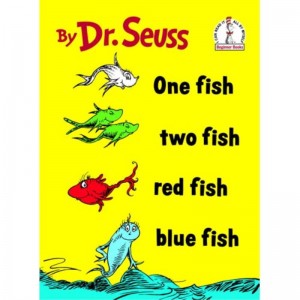
Photo credit: http://www.adoremusbooks.com/onefishtwofishredfishbluefish.aspx
One of the great books is One Fish, Two Fish, Red Fish, Blue Fish – it’s the gold standard, it’s the ‘take the pebble from my hand’ book. What’s interesting is you actually have to coach actors to identify the patterns. So, what do we have to do when we’re reading that book?
Here’s one example: you have to encourage people to finish final consonants. I’m a voice coach and what do I have to do more than anything? Encourage people to finish final consonants, don’t drop the energy at the end of the line. That’s what I say more than anything else. “Say! Look at his fingers! One, two, three… how many fingers do I see?” We get people reading it really flat. But “three” is more than “one” so you have to tell people, “can I hear in your voice that three is more than one?” Then, the fact that he has eleven fingers is a big discovery, because you’ve built up to that. But modern actors, even at a pretty high level, are not going to do that, so they’re not going to get that wonderful discovery that happens, because they haven’t explored what it means for eleven to be more than one.
Then, there’s any number of pieces of Shakespeare that you can find that have that kind of repetition in them. Claudius’s ladder of thought in Hamlet is a classic example.
Do the Dr. Seuss, then do the Claudius one:
“Say! Look at his fingers! One, two, three… how many fingers do I see? One, two, three, four, five, six, seven, eight, nine, ten, he has eleven! Eleven! This is something new. I wish I had eleven, too!” (One Fish, Two Fish, Red Fish, Blue Fish)
“Give me the cups,
And let the kettle to the trumpet speak,
The trumpet to the cannoneer without,
The cannons to the heavens, the heaven to earth,
Now the King drinks for Hamlet.” (Hamlet 5.2.)
Do you have a favourite line from each of these writers?
A favourite line from Seuss… maybe: ‘Unless someone like you cares a whole awful lot, nothing is going to get better, it’s not’ (The Lorax). Also fond of the book: Oh, The Places You’ll Go! It’s full of wonderful philosophy, which takes me to, ‘To thine own self be true, And then it must follow, as the night the day, thou canst not then be false to any man.’ (Hamlet). We get the philosophy of both writers giving advice to young men going out into the world. I have sons.
David Ley holds an MFA in performance from York University with a diploma in Voice Teaching. He is a Professor in the Drama Department at the University of Alberta where he teaches Voice and Speech, Dialects, and Acting. David has extensive experience in private practice teaching vocal skills to a wide array of professional voice users from schoolteachers to politicians and has taught many voice workshops both across Canada and abroad. He spent ten seasons as a Voice Coach at Canada’s Stratford Festival and continues to be a regular instructor in Stratford’s Birmingham Conservatory. He has done numerous feature newspaper interviews commenting on dialects and vocal performance and has been featured in two CBC documentaries on Canadian speech. Media outlets around the world have covered his work on the Vibrant Voice Technique including: The Toronto Star, The Globe and Mail, The Guardian UK, the Huffington Post, Metro News International, and many others. David has 30 years of experience working as an actor in theatres across Canada and has acted in numerous film and television productions.
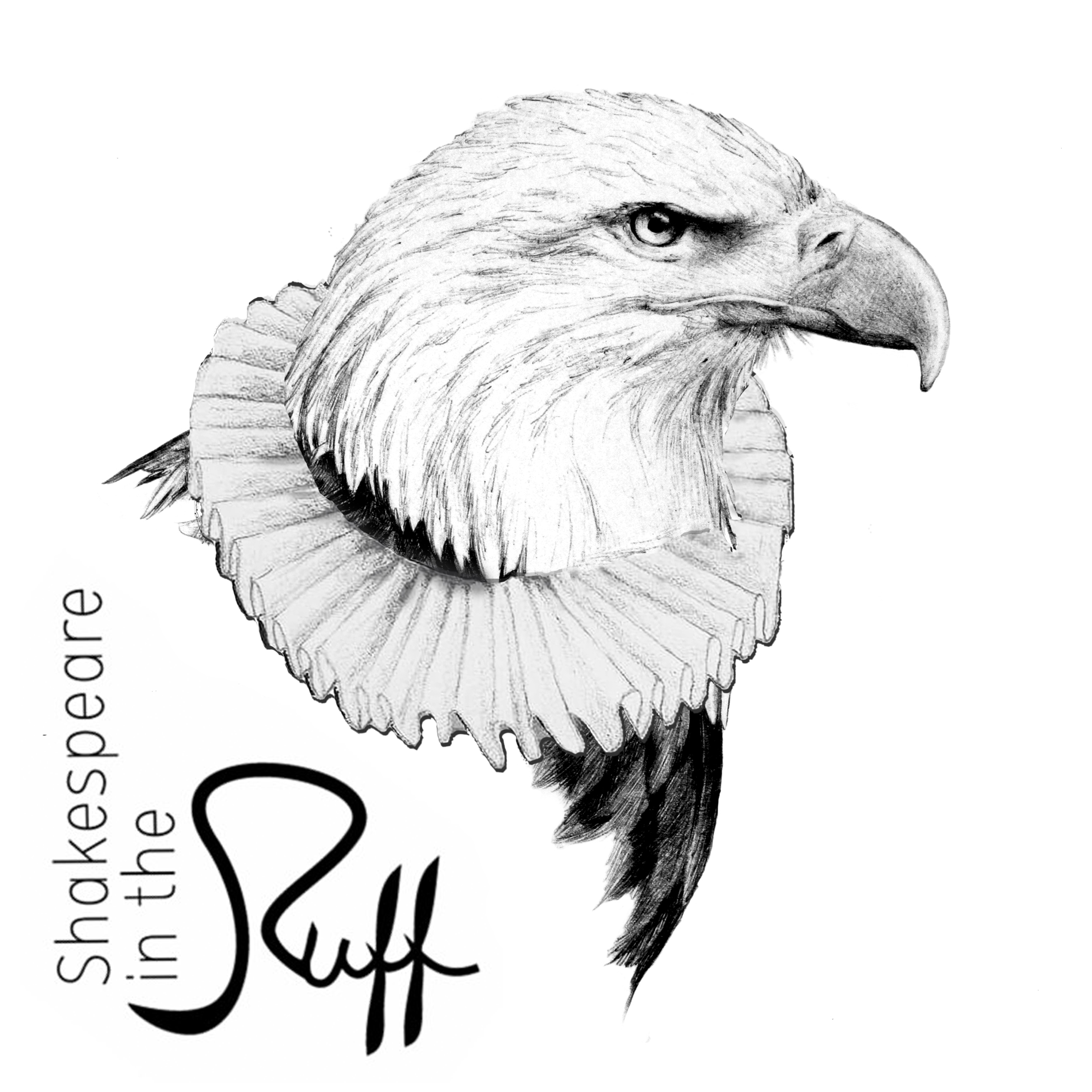
Right, so after an obscure comedy like Two Gents, and a dark twisted play like Richard III, it perhaps would have made sense for us to do a really nice production of Twelfth Night. And believe me, we thought about it. But one of the things we keep talking about at Ruff is our desire to take the risks that we wouldn’t be able to take if we were running a big operation like Stratford, with millions of dollars at stake. Ultimately we just want to have fun, and believe me Cymbeline = Crazy-Amounts-Of-Fun.
I was also incredibly baffled by this play when I first read it. Through the lens of the psychological dramas Shakespeare is famous for, Cymbeline appears to be some freakish accident by a senile playwright past his prime. The scope of the play is huge – many seemingly disparate plot lines, huge characters, and one improbable event after another. Really, it’s totally crazy. But writing Shakespeare off as past his prime seemed too easy – he was only 46 when he wrote Cymbeline, and this play, along with Pericles, marked the beginning of what seems to have been a very intentional shift in style and content of his playwrighting, now grouped together as the Romances. It seemed to me that he was evolving past the naturalism that we now revere him for and into something more sophisticated and intuitive, loosening up his verse and creating epic, larger than life stories.
And then, fortuitously, I went to a cold-reading of Cymbeline by the wonderful group The Howland Company and in the discussion afterwards, as we tried figuring out what the hell was going on in this play, someone brought up Picasso and Cubism. Picasso was the son of a naturalistic painter and from an early age had mastered his father’s craft. Having perfected this he moved on to explore a new form of expression and ended up with Cubism – reality viewed through a sort of prism. I found this an exciting way to look at Cymbeline – a piece created as an exploration of new forms of storytelling, a kind of theatrical Cubism. It was after this that I knew I wanted to direct this show, and that it was the perfect choice for Shakespeare In The Ruff
But if I’m being honest here, the real reason we chose Cymbeline was because of the mind-blowing stage direction: Jupiter descends in thunder and lightning, sitting upon an eagle. He throws a thunderbolt. Mother f#%*ing Jupiter on a mother f#%*ing Eagle!!!!!!!!!!!!!!!!! See you in August in Withrow Park.
*************
This is the simplest version of a Synopsis I can come up with: Imogen, a princess, gets married to her lover in secret against the wishes of her father – King Cymbeline. Her husband is banished and she flees the kingdom to join him, but in the meantime her husband has been tricked by a crazy Italian man into thinking Imogen has been unfaithful and he now wants her dead. All of a sudden the outbreak of war throws everything into chaos and the couple must survive until everything is made clear and they can be reunited. This doesn’t even included men hiding in chests, the evil step-mother, beheadings, long-lost brothers, prophesies, and the deus ex machina. A more complete synopsis can be found on Wikipedia.
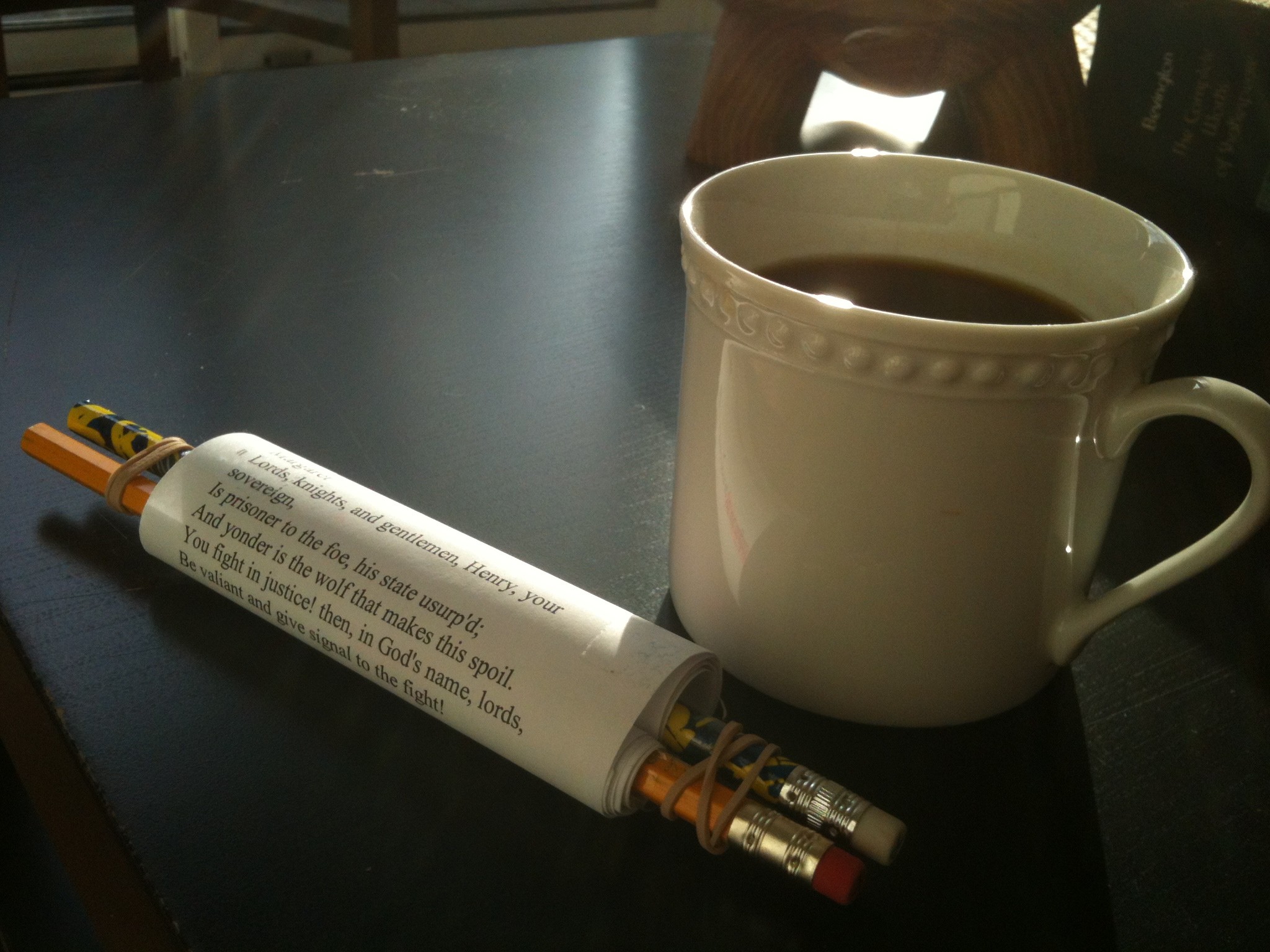
Last October, we took our Original Practices Experiment to The Stratford Festival where company member Kaitlyn Riordan was working. Actors received a scroll with their lines and cues, were asked to memorize it all, not read the play, and then come together and perform it in front of an audience, having never rehearsed together. We began playing with this concept two years ago at our Season Launch party and a week from today (April 14th) we hold our third annual Ruffing It. Actress Carmen Grant spoke to us afterwards about her experience last October and the mayhem of playing Elizabeth in ‘Henry VI, Part III’, having never spoken the lines to another actor before encountering an audience.
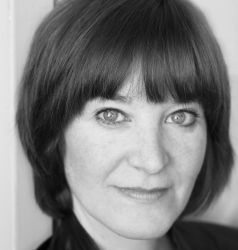 Ruff: Can you describe the challenge of working this way?
Ruff: Can you describe the challenge of working this way?
CG: I found that learning the lines was the greatest challenge for me within this process. I felt excited by the mystery of the process, but the majority of the morning was spent in a state of suppressed panic! As you know, learning lines is so much more than just memorizing words on a page. The motivation and objective of a character comes from what’s being sparked within their human impulses and, more often than not, a cue comes well before the other actor reaches the end of their line! But with only four words as a prompt (sometimes less!), the context of what I was saying was not clear. So, I would say my biggest challenge was learning the lines without knowing the entire text.
Ruff: How was it different from your normal process?
CG: My normal process is to read the entire play over and over again, so that I understand the story implicitly before I attempt to memorize my lines. That way, the lines I have to speak are already imbued with an understanding of not only my character, but the other characters in the play, how I feel about them, and the world as a whole. I usually find that by the time I’m on my feet in the rehearsal hall, I know the lines so well, I can almost forget them and am able to respond to the other actors in the scene by simply listening to what they are saying. The cues in their lines jump out at me more easily that way and the need to listen in a state of panic is removed! On the other hand, that’s part of what was exciting about it. The need to listen very hard to what the other actors were saying made for edge-of-your-seat presence onstage.
Ruff: What surprised you most on the day?
CG: When I realized that George wanted Elizabeth as his wife, I had already made the choice to seduce Edward whole-heartedly … and it could have been REALLY interesting to play with the idea that Elizabeth actually wanted George as much as he wanted her and NOT, in fact, Edward – as the brothers’ text seems to indicate.
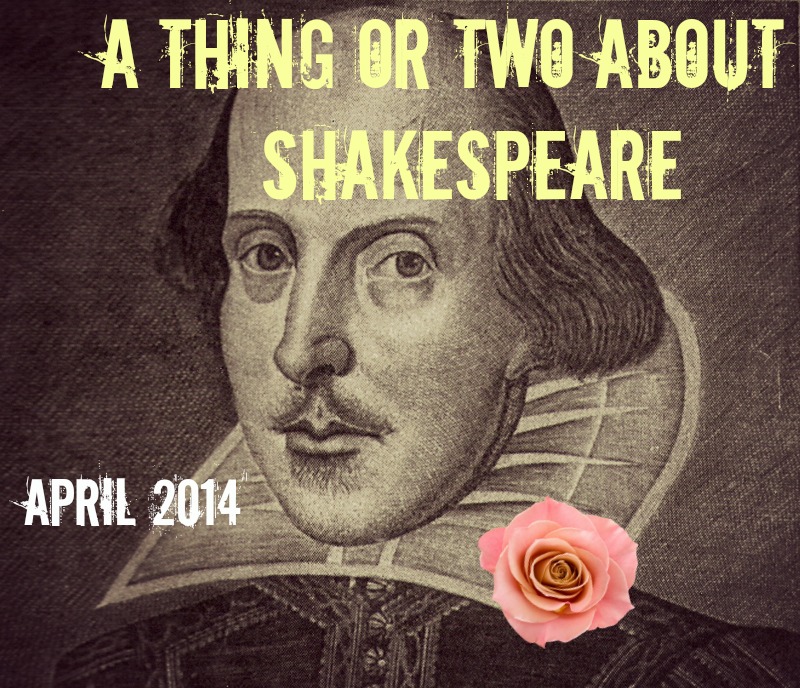
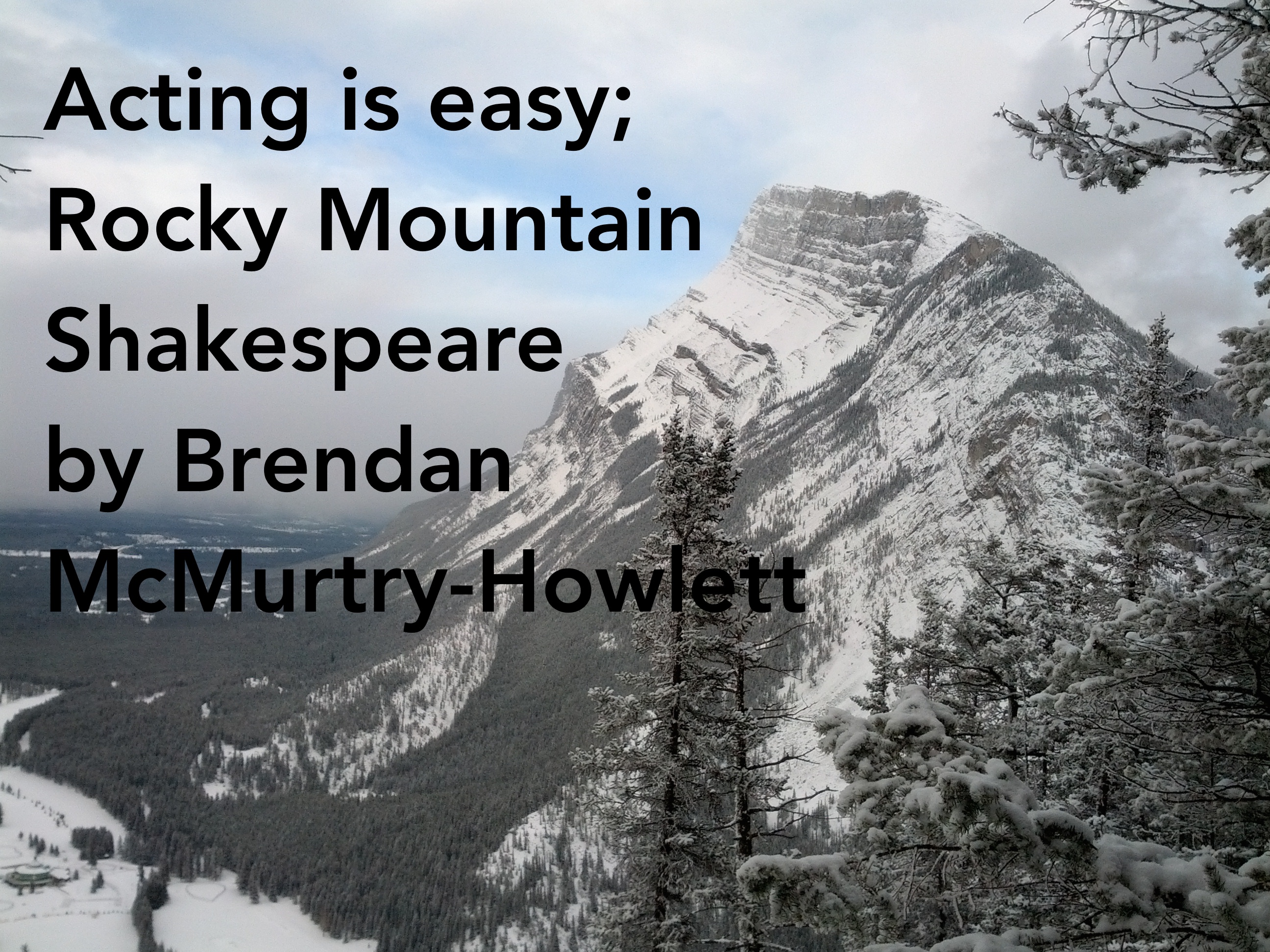
Ruff’s Artistic Director, Brendan McMurtry-Howlett, has been on a ‘sabbatical’ of sorts out west, taking part in the Banff/Citadel Professional Theatre Program. The program has two stages – a four-week residency at the Banff Centre for the Arts and then two months working on a production for Edmonton’s Citadel Theatre’s main-stage season. In his case, Brendan is preparing to play Romeo, in Romeo & Juliet, which opens April 5th (show info). He learned many lessons, which he plans to share with the company and put into practice this summer when he directs Ruff’s show. Here, Brendan shares one the biggest takeaways he had from the training.
“Acting is Easy”:
Well actually, I should say acting is easeful; though this is easier said than done. This is something that our two voice coaches, Susan Stackhouse and Alana Hawley, emphasized during my time at Banff and one of the most important lessons I took away from my time there.
As a kid I played a lot of sports in school. I was never particularly skilled at anything I couldn’t catch a football to save my life, but my advantage was that I was a damn fast runner. I pushed myself in this – always running faster, harder. The lesson I took away was that if you want to get better at something, then just work harder, use more muscles, sweat more and you’ll eventually be better. This lesson has served me well in life so far, but the problem is that I’ve also applied it to my acting. Unfortunately it doesn’t quite translate. Acting requires quite a bit more subtlety than that. Straining every muscle in your body won’t necessarily take you to the emotional place that Hamlet requires. In fact, so I’ve found during my time in Banff, it might actually prevent you from getting there.
My early sports lessons have translated into a tendency in my acting to work too hard at showing people how “good” an actor I am. This frequently means lacing every muscle in my body with as much tension as possible. For myself, I imagine it also comes from a feeling that who I am and what I’m feeling isn’t interesting or good enough to watch on stage. The result, though, is that who I am gets buried underneath all of those over-working muscles and that is definitely not interesting to watch on stage.
Muscles protect us. If we’re getting punched or hitting streetcar tracks and flying over our handle bars, flexed muscles protect us from breaking bones or damaging precious internal organs, but on stage, protection is the last thing we want, especially when it comes to accessing emotions. The goal is always to be as naked and vulnerable as possible, so that we can react honestly and emotionally to what happens to our characters in the course of a play. I guess this is why voice teachers are always doing so much relaxation work with actors.
One of my big “Ah-ha” moments during my time in Banff came while working with James MacDonald and Alana Hawley on a speech from Hamlet (Act 3, Scene 4 – Look here upon this picture…). I’m sure I’m not the only actor out there who sometimes carries tension in their shoulder and jaw muscles and working on this speech was no exception. There I was, a good student hitting all my line endings (thank you James), and discovering all my thoughts, but I wasn’t connecting to what I was saying in any kind of emotional way. Instead, I was flapping my arms around and reaching my head forward like a sprinter trying to get his nose across the finish line before anyone else.
Eventually, Alana came up and gave my neck and jaw a gentle massage, releasing the insane amount of tension held there. I went back at the speech, trying to consciously release it. At a certain point in the speech, I felt my neck tense and my shoulders ride up to my ears. I took a moment and relaxed and instead of leaning forward, I stood tall and continued. All of a sudden, stuff just started pouring out of me – I was blubbering away like a baby, tears and snot flowed out of me, but I was still riding the text like a beautiful wave of words and thoughts. It was unreal. I was one of the most pure moments of connection and “acting” I’ve ever experienced and it all came from simply relaxing.
Of course, when I did the speech again the next day all that tension was back and I couldn’t summon a single tear, even if my life had depended on it. I was trying to recreate that same moment and the more I tried, working it like an athlete, the further away I got from it. I was frustrated, but James reminded me that the emotional connection is the hardest part of acting and takes an entire lifetime to develop. One of the things he likes to say is “The only thing that is guaranteed to make you a better actor is age,” meaning, the more life you live, the more experiences you have, good and bad, the more emotional reference points you have in your acting. So thank you, James. I’ll take that small victory I found in Banff and keep living my life and then I’ll find my way back there once I’ve lived through enough emotionally-wrenching experiences in my life. Sounds fun, right? Can’t wait.
“Ah-ha” moments are few and far between. Have you ever had one while working on Shakespeare? What does it mean for you now?
Applications are now being accepted for the Banff/Citadell Program for 2015-apply here
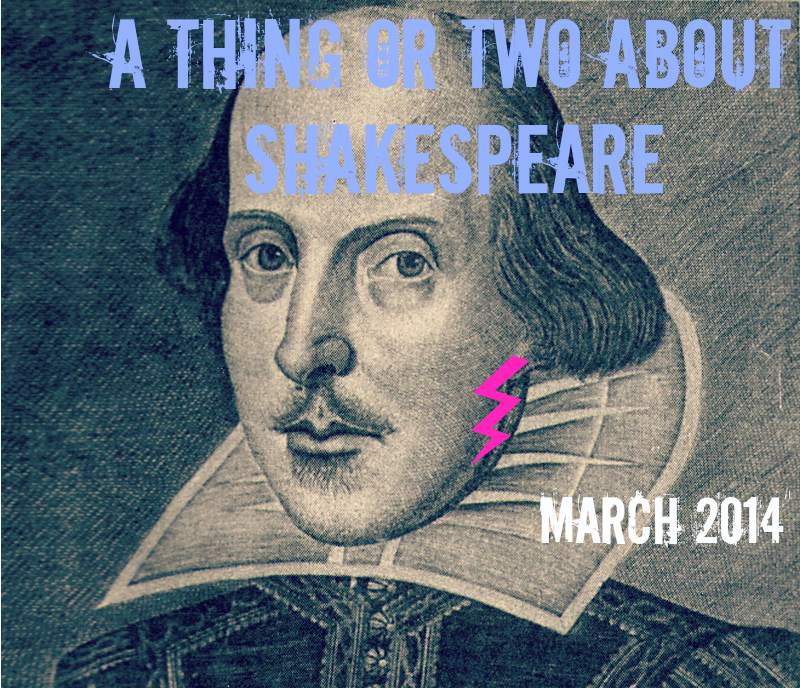
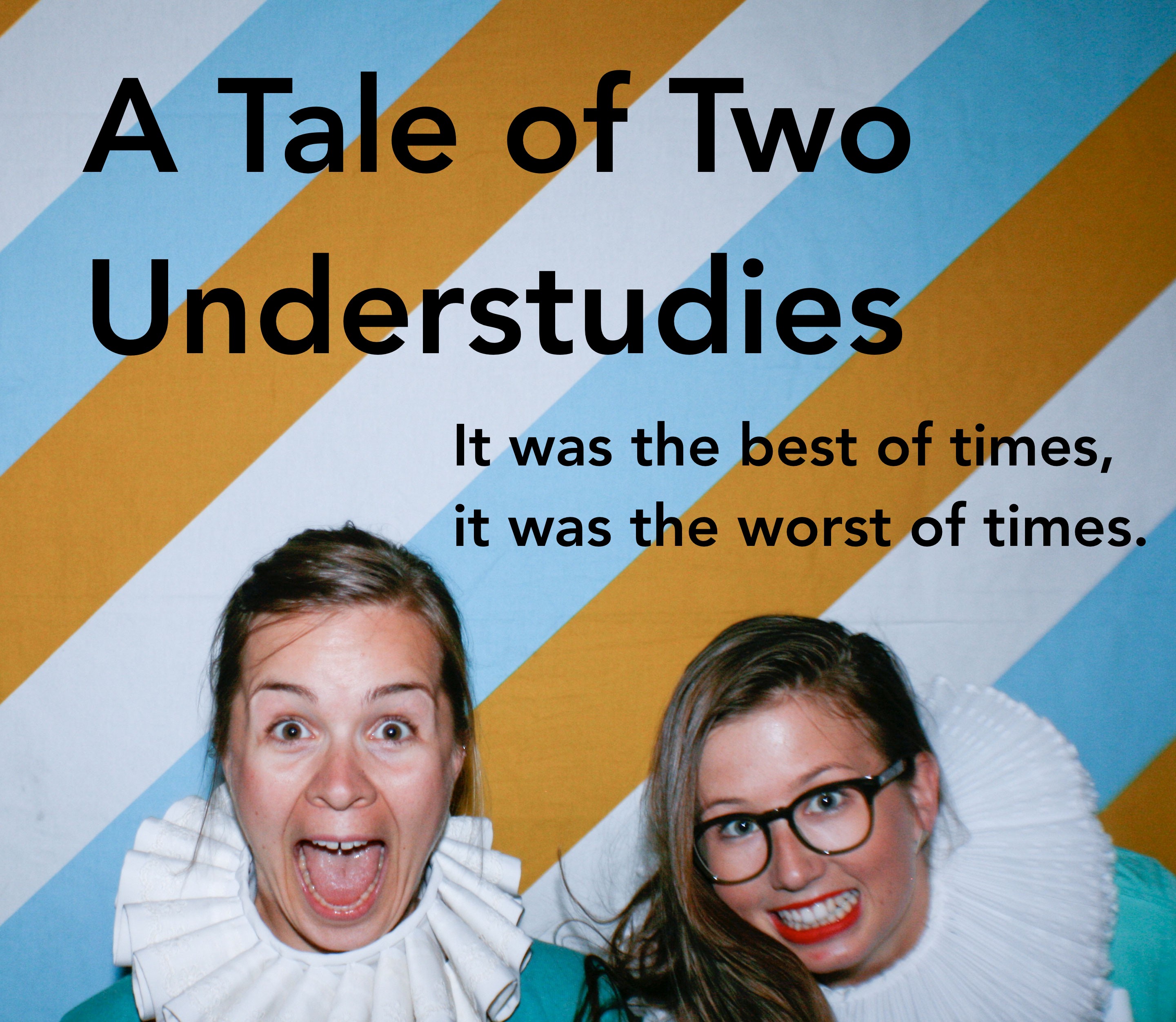
Being an understudy used to be a right of passage for any actor working in the theatre. That’s how many people got their start in the business; a kind of trial by fire experience that could be the making or breaking of any actor. These days, however, an understudy is a luxury that very few theatres can afford anymore, and being an understudy is not something that was ever covered in theatre school…trust us.
However, actors get sick, actors get hurt, actors get drunk, or at least they used to anyway, and understudies will always be needed. This past season, Shakespeare in the Ruff Company Member, Kaitlyn Riordan, was at The Stratford Festival where she understudied two hefty roles and James Wallis, Shakespeare BASH’d founder and Artistic Director, found himself as an unexpected understudy in his own production of ‘Romeo & Juliet’.
I spent a huge portion of my time this passed season learning lines and then rehearsing them alone, in my living room. Being an understudy required an enormous amount of self discipline, especially when the parts you’re covering have so much to say! I went into it without really knowing how it was done and what was off-putting was that no one had any definite answers for me. Where do you begin? Do you make all the same choice as the other actor? How do you go on stage in front of 1800 people and play Portia in ‘The Merchant of Venice’ having had only 4 rehearsals? The nuances of it were trusted to me to decipher, but the technicalities of the process it were this:
-Understudy line run half way through the rehearsal process (we sat in a circle and spoke our memorized text)
-Two blocking rehearsals (led by our Stage Manager, when copious amounts of notes are taken,)
-Two rehearsals on the stage (led by the Assistant Director and, in the case of The ‘Merchant of Venice’, took place on the Festival Stage at Stratford, one of the most magnificent stages I have ever been on. We do a run and get notes. I never thought I’d be so happy to get notes.)
And that’s it. Of course the scope of the work that I did on my own was vast, but what became clear to me was how valuable the rehearsal process is. Just having those words in you is thrilling, but then you have to be sure to keep them in you, because a show can run for months. Lots of understudies went on this past season, and by all accounts, did very well. I, for better or for worse, was not one of them. Many would argue, Shakespeare in the Ruff included, that Shakespearian actors probably didn’t rehearse at all, so understudying is more like the original experience. To that I say, they can keep it.
James:
To begin at the end, I would say it was the most terrifying moment of my professional life.
There’s a thin line, I believe, between excitement and terror. I straddled that line as I began this crazy journey of picking up Mercutio with 10 hours to prepare. More than straddled – I rode that line like a freakin’ dragon.
It was the third night of my company’s five-night run of “Romeo and Juliet,” which I had directed, at The 3030 in the Junction. My company, Shakespeare BASH’d, does Shakespeare in a bar to create a relaxed setting for the audience to experience the plays. We were happy and proud of our show and we were ready for another sold-out crowd!
The show was going well, but when the boys (Romeo, Benvolio and Mercutio) began their big scene, I noticed that halfway through, as Mercutio starts on his rant about “Queen Mab,” he was standing still. Up till then, Milan Malisic (who played Mercutio) had been very frantic and physical with his movements during that speech, so I was certain that something was wrong. Or maybe he was taking some of my notes of stillness? But as I saw my friend Milan limping off the stage, I knew something was up.
After the scene, I dashed backstage to find almost the entire cast huddles around Milan, who was clutching his ankle in pain. However, the show would go on. And with the help of my wonderful company, it did. Milan, miraculously, was able to finish the first act, basically on one leg, and as soon as Mercutio died, he was off to the hospital. I was distraught – no one should get hurt doing theatre – and after the show, I received a text from Milan saying he had torn his Achilles tendon. Which meant we were without one Mercutio.
I began thinking of how to fill the role and I soon realized that the only other option would be for me to go on which, I must say, was not an easy decision, but seemed like the best one to preserve the show. Then the cramming began. After the show, I had script-in-hand looking over the scenes. I was up most of the night working in my living room with my wife, Julia Nish-Lapidus. I was with Jesse Griffiths the next day drilling the scenes. It was as if my hand was permanently attached to a copy of “Romeo and Juliet” and I was spouting Mercutio text like a Berserker. Miraculously, I somehow knew most of it and so preparing was relatively straightforward. To my relief, the words were sticking.
First, I went for sense, trying to make sure that I knew “what, why, who” in the text, and I’m thankful that, as a company, we had taken the time to work on early in rehearsal. Then, I started to think about what I thought this guy was about. Why was Mercutio such a tremendous spirit? What was his “endgame”? By that I mean, what was he trying to achieve? On top of that, I knew that I needed to connect with the text, my fellow actors, the audience, etc. Milan had brought such energy to it, which I wanted to keep, though I knew it would have to be different. I would have to rely on the words as much as possible to propel me through the adventure of Mercutio.
I can’t explain how nervous I was. I don’t think I’ve ever experienced it before. Facing an audience with such little prep time, despite being confident that I knew the words (and being an actor primarily), was certainly not my idea of a good time. I was up there on the deck with no rehearsal of most scenes and the fear that I might just dry completely, without a hope of pulling myself out of the theatrical hole. That feeling of my blood running at its height, I will never forget. At one point at the end of “Queen Mab,” Romeo said “Peace, peace Mercutio thou talk’st of nothing.” After a moment to catch my breath I replied with “True…” I will never forget the reaction of that audience – not just the laughs (there were a few, which was nice), but also the recognition that they were with me, listening intently and understanding. “At least I was doing it right,” I thought as I chopped my way through the weeds of the next text monster.
The thing that really grounded me was that I knew I had such a great company there to back me up. My fantastic scene partners – Kelly Penner as Romeo, Kyle Purcell as Benvolio or Jeff Yung as Tybalt, amongst others – really taking care of me as we did the third act fight between Mercutio and Tybalt. And Jeff trusting that I wouldn’t stab him to death! On the second night, the nerves were less striking or at least I knew that if I had done it once I could do it again. I was trusting myself more. I was finding more and more to cling to in the text which was exciting! Too bad it was closing night.
All in all, I tried to find him within myself as fast as possible. With great help from a tremendous company I was able to have a fraction of success in the Mercutio. My final word on this experience: I never want to do it again.
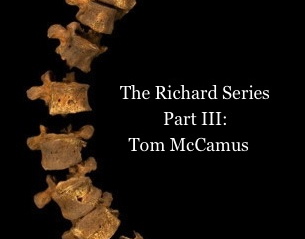
In the final instalment of our Richard Series, we speak to Tom McCamus, who played Richard at The Stratford Festival in 2002 and is currently spending his 13th season at the Festival, playing Friar Laurence in ‘Romeo & Juliet’ and Antonio in ‘The Merchant of Venice’. In our series, Tom arguably brings the most traditional approach to the role of Richard III, but as anyone who has seen Tom act can attest to, his invention and perspective are anything but conventional.
1-What was your relationship with the audience while playing Richard and did it change throughout the play?
Particularly at the beginning of the play, I spoke to the audience. Someone told me once that the best way to do that kind of thing, if you’re playing Richard III, is to imagine that the whole audience is made up of Richards, the assumption being that they all agree with you, so that you’re not trying to convince anyone. And that’s what I thought about and it made me laugh and it worked out well, because he’s such a fabulous, theatrical character. The connection with the audience diminishes as the play goes on, but I did this one thing throughout with a list – as I talked about all the people who were dead, I’d cross them off the list. Towards the end, I crossed the wife off and that was pretty direct to the audience, but by that point, Richard actually wasn’t looking for anything from them. I feel like he cuts them out partly because he’s becoming more and more concerned about everything falling apart around him to be too much aware of the audience.
2-How did you develop the physicality of the part and what informed your choice?
I kept talking to people when I first got the part and they’d ask, ‘Are you gonna have a hump?’ and I’d think, ‘Of course I’m gonna have a hump; if you’re playing Richard III, you’re gonna have a hump.’ But I used to say to them, ‘Oh no, no, no – we’re gonna start the play sitting at a desk and he’s gonna look totally normal, talking to the audience, and then halfway through the scene he’s gonna get up from the desk and he’s gonna have the biggest bum you’ve seen in your whole life and then he’ll spend the entire play having to turn sideways to get through doors.’ That made me laugh a lot, but then somebody said, ‘Careful – if you tell Martha (Martha Henry, the director), she might actually suggest you do that.’
Ultimately, for the physicality, I had a hump, but it wasn’t huge – it was more of a small deformity – and I also played with various degrees of Cerebral Palsy. I did the play ‘Creeps’ a long time ago, so I had explored that type of physicality and that kind of fit with Richard. My basic premise was that it came and went, depending on what he wanted from people. So, if he wanted more, the hump would be bigger, because it would elicit a certain amount of pity and then nobody would think he was a threat. He was like a dog that everybody kicked out of the way and before they knew it, boom, he was there.
3-Did anything surprise you about playing the role?
Everything. I didn’t know a lot about it when I went to play it, so I was surprised by how funny he was, how theatrical, how different he was from everybody else in the play, just in the writing of it and in the character of it. I was surprised that he really had no feeling for anything or anybody, other than himself. It’s a pretty early play and there’s a lot of verse and structure to it, but Richard’s kind of outside of that structure.
Another surprise is the way people reacted to things I did. They often said, ‘Why does he fall (out of a tree at the beginning and during the coronation)?’ or ‘You shouldn’t have done that,’ about all kinds of things I thought were great. Part of it, especially with Shakespeare, is that people have such a strong idea of what it should be and if what you do doesn’t fit, they don’t always embrace it, and that surprised me. Most of the Shakespeare I’ve done, I’ve discovered, they haven’t been roles I’ve always wanted to play and so I just do whatever comes to me.
Ruff’s ‘Richard III’ is playing from Aug 13th-Sept 1st in Toronto’s Withrow Park. All the information can be found at www.shakespeareintheruff.com.